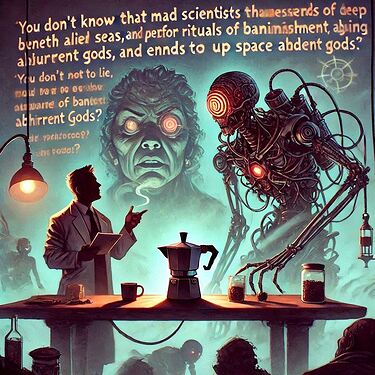Thoughs at the end of the Spring Thing 2025
It seems to me to be a tradition that, at the end of the competition, the author writes notes on the game he has presented: the so-called "post-mortem".
This is the post-mortem of Espresso Moka.
No one is forcing you to read it: however if you do, it can only please me.
It's just a game.
This is the state of mind I have when writing interactive fiction. I create a small world to explore, first of all for me.
I propose it to the competitions to have a showcase that I wouldn't otherwise have; there are people who play it and some leave their opinions.
It's interesting to see how so many people expect so much to happen, when the fun should simply be in exploring the proposed world.
Reading the reviews of my first game I decided to write a smaller game and I used some of the criticism I received to make gags out of it.
This is how Espresso Moka was born: behind a rather banal activity, such as buying a moka and using it to prepare a coffee, there are a few little surprises.
The main problem lies in using a moka pot, an activity that might seem trivial to an Italian, but not at all obvious elsewhere.
In fact Viv writes: "I have never used a moka pot. Though I have seen some YouTube clips using one."
She closes her review with "Must resist buying a moka pot..." followed by a series of messages, including mine, inviting her to be won over by the charms of a moka coffee.
The game is essentially a pastime; Bellamy writes: "Espresso Moka feels like the kind of game that you’d spend half an hour playing through on a warm, quiet, summer day."
Yes, it's exactly what I wanted.
JJMcC, who rather severely criticised the previous game, writes: "Buy and make some coffee. Buuut is that really the work’s aim? Or is it to taunt and double down, not trolling exactly, more like playfully tweaking self-important blowhards like me? Yeah, it’s definitely the latter."
But then, after giving an example of these quotations, he comments "I honestly laughed out loud at that.".
That's is the goal: to get a smile out of it.
He then concludes his review with: "If this were my project, I would need to seek professional therapy, as clearly development would have devolved into an extended, schizophrenic shouting match with myself."
But we're all so different, aren't we? You know, it's so great to see all these different people coming together for these competitions. Wouldn't it be a bit sad if we all did things the same way?
Completing the list of reviews is that of Wolfbiter, who a few days later writes: "Overall, a nice refinement on the ideas from the prior game, perfectly pleasant and lightly funny"
The players who left their comments all said they found themselves laughing, even those who seemed not to like the game very much, and that to me is a great achievement.
As I said at the beginning, this is all just a game to me, and putting a smile on the faces of those who play is the only worthwhile result.
Another interesting experience. What will happen next?
I have been developing software professionally for decades; writing source code is an art form, even more so when using languages like Inform 7.
I realize that sometimes I find it more interesting to read the source rather than the story that comes out of it.
So, I will certainly release the sources for the story and a set of specially created extensions shortly.
One of these, Reflection is already available, others are enhancements of those included in Breakfast in the Dolomites that maybe could be useful to someone.
In the main story you could find other easter eggs you didn't discovered during the play.
I don't know if there will be a sequel to this story. For now, I have to find something that I enjoy writing and playing with first.
Incidentally, I was also the recipient of a prize, which was a beautiful book on how to manage fun in games. Maybe it will inspire me, who knows?

Poggiorimini 1986 by Roberto, su Flickr
